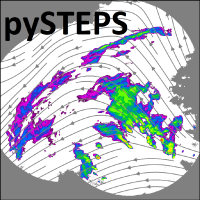Installing pysteps#
Dependencies#
The pysteps package needs the following dependencies
python >=3.9, <3.12 (lower or higher versions may work but are not tested).
Additionally, the following packages can be installed for better computational efficiency:
Other optional dependencies include:
cartopy >=0.18 (for geo-referenced visualization)
h5py (for importing HDF5 data)
pygrib (for importing MRMS data)
gdal (for importing GeoTIFF data)
pywavelets (for intensity-scale verification)
pandas and scikit-image >=0.19 (for advanced feature detection methods)
rasterio (for the reprojection module)
Important: If you only want to use pysteps, you can continue reading below. But, if you want to contribute to pysteps or edit the package, you need to install pysteps in development mode: Contributing to pysteps.
Install with conda/mamba (recommended)#
Conda is an open-source package management system and environment management system that runs on Windows, macOS, and Linux. Mamba is a drop-in replacement for conda offering better performances and more reliable environment solutions. Mamba quickly installs, runs, and updates packages and their dependencies. It also allows you to easily create, save, load, or switch between different environments on your local computer.
Since version 1.0, pysteps is available on conda-forge, a community-driven package repository for conda packages.
To install pysteps with mamba in a new environment, run in a terminal:
mamba create -n pysteps python=3.10
mamba activate pysteps
This will create and activate the new python environment called ‘pysteps’ using python 3.10. The next step is to add the conda-forge channel where the pysteps package is located:
conda config --env --prepend channels conda-forge
Let’s set this channel as the priority one:
conda config --env --set channel_priority strict
The latter step is not strictly necessary but is recommended since the conda-forge and the default conda channels are not 100% compatible.
Finally, to install pysteps and all its dependencies run:
mamba install pysteps
Install pysteps on Apple Silicon Macs#
On conda-forge, pysteps is currently compiled for Mac computers with Intel processors (osx-64). However, thanks to Rosetta 2 it is possible to install the same package on a Mac computers with an Apple Silicon processor (arm-64).
First, make sure that Rosetta 2 is installed:
softwareupdate --install-rosetta
Use mamba to create a new environment called ‘pysteps’ for intel packages with python 3.10:
CONDA_SUBDIR=osx-64 mamba create -n pysteps python=3.10
mamba activate pysteps
Make sure that conda/mamba commands in this environment use intel packages:
conda config --env --set subdir osx-64
Verify that the correct platform is being used:
python -c "import platform;print(platform.machine())" # Should print "x86_64"
Finally, run the same pysteps install instructions as given above:
conda config --env --prepend channels conda-forge
conda config --env --set channel_priority strict
mamba install pysteps
We can now verify that pysteps loads correctly:
python -c "import pysteps"
Note that the first time that pysteps is imported will typically take longer, as Rosetta 2 needs to translate the binary code for the Apple Silicon processor.
Install from source#
The recommended way to install pysteps from the source is using pip
to adhere to the PEP517 standards.
Using pip instead of setup.py guarantees that all the package dependencies
are properly handled during the installation process.
OSX users: gcc compiler#
pySTEPS uses Cython extensions that need to be compiled with multi-threading support enabled. The default Apple Clang compiler does not support OpenMP. Hence, using the default compiler would have disabled multi-threading and may raise the following error during the installation:
clang: error: unsupported option '-fopenmp'
error: command 'gcc' failed with exit status 1
To solve this issue, obtain the latest gcc version with Homebrew that has multi-threading enabled:
brew install gcc
To make sure that the installer uses the homebrew’s gcc, export the following environmental variables in the terminal (supposing that gcc version 8 was installed):
export CC=gcc-8
export CXX=g++-8
First, check that the homebrew’s gcc is detected:
which gcc-8
This should point to the homebrew’s gcc installation.
Under certain circumstances, Homebrew does not add the symbolic links for the gcc executables under /usr/local/bin. If that is the case, specify the CC and CCX variables using the full path to the homebrew installation. For example:
export CC=/usr/local/Cellar/gcc/8.3.0/bin/gcc-8
export CXX=/usr/local/Cellar/gcc/8.3.0/bin/g++-8
Then, you can continue with the normal installation procedure described next.
Installation using pip#
The latest pysteps version in the repository can be installed using pip by simply running in a terminal:
pip install git+https://github.com/pySTEPS/pysteps
Or, from a local copy of the repo:
git clone https://github.com/pySTEPS/pysteps
cd pysteps
pip install .
The above commands install the latest version of the master branch, which is continuously under development.
Warning
If you are installing pysteps from the sources using pip, the Python interpreter must be launched outside of the pysteps root directory.
Importing pysteps from a working directory that contains the pysteps source code will raise a ModuleNotFoundError.
This error is caused by the root pysteps folder being recognized as the pysteps package, also known as
the double import trap.
Setting up the user-defined configuration file#
The pysteps package allows the users to customize the default settings and configuration. The configuration parameters used by default are loaded from a user-defined JSON file and then stored in the pysteps.rcparams, a dictionary-like object that can be accessed as attributes or as items.
Final test: import pysteps in Python#
Activate the pysteps environment:
conda activate pysteps
Launch Python and import pysteps:
python
>>> import pysteps
